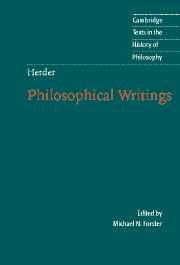Book contents
- Frontmatter
- Contents
- Introduction
- Chronology
- Further reading
- Note on the texts and translation
- Part I General Philosophical Program
- Part II Philosophy of Language
- Part III Philosophy of Mind
- Part IV Philosophy of History
- Part V Political Philosophy
- Letters concerning the Progress of Humanity (1792) [excerpts on European politics]
- Letters for the Advancement of Humanity (1793–7) [excerpts concerning freedom of thought and expression]
- Letters for the Advancement of Humanity (1793–7) [excerpt on patriotism]
- Letters for the Advancement of Humanity (1793–7) – Tenth Collection
- Index
- Cambridge texts in the history of philosophy
Letters concerning the Progress of Humanity (1792) [excerpts on European politics]
Published online by Cambridge University Press: 05 June 2012
- Frontmatter
- Contents
- Introduction
- Chronology
- Further reading
- Note on the texts and translation
- Part I General Philosophical Program
- Part II Philosophy of Language
- Part III Philosophy of Mind
- Part IV Philosophy of History
- Part V Political Philosophy
- Letters concerning the Progress of Humanity (1792) [excerpts on European politics]
- Letters for the Advancement of Humanity (1793–7) [excerpts concerning freedom of thought and expression]
- Letters for the Advancement of Humanity (1793–7) [excerpt on patriotism]
- Letters for the Advancement of Humanity (1793–7) – Tenth Collection
- Index
- Cambridge texts in the history of philosophy
Summary
What spirit [Geist] is, my friend, cannot be described, drawn, painted – but it can be felt, it expresses itself through thoughts, movements, through striving, force, and effect. In the corporeal world we distinguish spirit from the body and attribute to spirit what ensouls the body down to its elements, what holds life within it and awakens life, what attracts forces and reproduces forces. Hence in the oldest languages spirit was the expression for invisible, striving might; on the other hand, flesh, person, body, corpse was the designation of dead inertness or of an organic dwelling, of a tool, which the spirit uses as a powerful occupant and artist.
Time is a thought-formation of successive, mutually linked, conditions – it is a measure of things, the things themselves are its measured content. Hence spirit of the times means the sum of thoughts, dispositions, strivings, and living forces which express themselves in a particular progression of things with given causes and effects. We never see the elements of events, but we do see their appearances and in doing so note their form and organization in a perceived connection.
Hence if we want to talk about the spirit of our time we must first determine what our time is, what scope we can and like to give it. On our round earth all the hours of the day exist at once, and thus also the spirit of the time in the present moment is not one and the same in Japan and China, in Tatary and Russia, in Africa and Tahiti, in North America and South America.
- Type
- Chapter
- Information
- Herder: Philosophical Writings , pp. 361 - 369Publisher: Cambridge University PressPrint publication year: 2002
- 1
- Cited by



